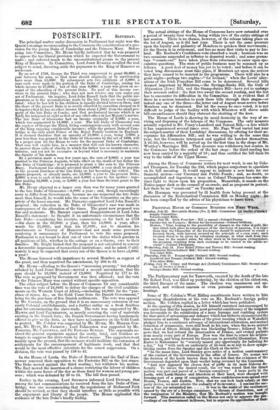The actual sittings of the Rouse of Commons have now
extended over a period of twenty-four weeks, being within two of the entire sittings of last session. There is no chance, however, of the release taking place on the 1st of August, as it did last year. There is not the same pressure upon the loyalty and gallantry of Members to quicken their movements; for the Queen is in retirement, and has no more first visits to pay to Ire- land. Mr. Roebuck's Confidence-vote absorbed a week ; business was on two occasions suspended as tributes to departed worth ; and some prema- ture "counts-out" have taken place from reluctance to enter upon spe- culative questions. The state of public business may be summed up as follows. A good deal of money has yet to be voted ; and before it can be voted long discussions must take place, if Members net upon the notices they have caused to be inserted in the programme. There will also be a great night—perhaps two nights—" for Ireland," when the Lords' alter- ations of the Irish Franchise Bill come to be denounced. Several bills deemed important by Ministers,—the Savings-Banks Bill, the Oath of Abjuration (Jews) Bill, and the Stamp-duties Bill—have yet to undergo their severest ordeal : the first two await the second reading, and the last has to encounter its difficulties in the Committee. It is evident that if there be a serious intention to push these bills through their stages—or indeed any one of the three--the:latter end of August must arrive before Members can be dismissed. But let the money be once voted, it is not difficult to judge of the facility with which Ministers will shove aside bill-encumbrances should they obstruct the shutting of the door.
The House of Lords is showing ifs usual dexterity in the way of re- vising and disposing of the labours of the Commons. The only measure actually rejected is Mr. Pusey's Landlord and Tenant Bill,—a fate which it has experienced several times over. Mr. Page Wood varied last year the subject-matter of their Lordships' discussions, by offering for their ac- ceptance his Affirmation Bill ; and he was willing to do the same this year, but the Commons interposed and applied the hatchet themselves. A fit-bit, however, will be served up for the first lime in the shape of Mr. Wortley's Marriages Bill. That measure was withdrawn last session in the Commons before the ordeal of the last stage : the third reading has now been carried by a majority of 10; and thus certified the bill finds its way to the table of the Upper House.
Among the House of Commons notices for next week, is one by Colo- nel Thompson, for Tuesday the 23d, which piques conjecture to speculate on its full meaning. It would appear to indicate a new basis for our financial system—our Currency and Public Funds ; and, no doubt, so accomplished and ingenious a man as Colonel Thompson has some dis- tinct light to throw upon his proposition. Meanwhile, it stands on the Notice-paper dark as the counsel of an oracle, and as pregnant in portent. Let there be no " count-out " on Tuesday next.
Mr. Horsman was prevented by ill health from being present at the discussion of the Ecclesiastical Commission Bill on Monday night : he has been compelled by the advice of his physicians to leave town.


























 Previous page
Previous page